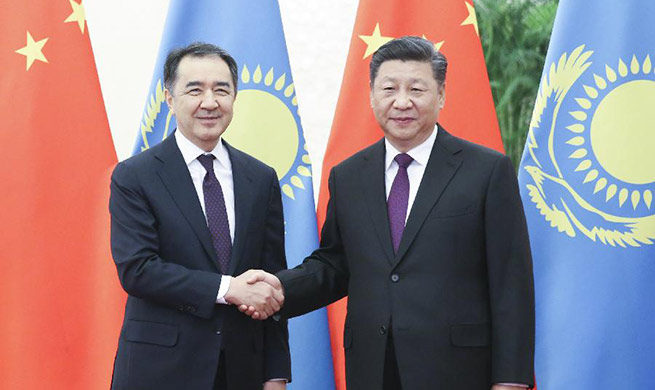TOKYO, Nov. 22 (Xinhua) -- Nissan Motor Co. Chairman Carlos Ghosn is alleged to have instructed a close aide and ally to doctor reports regarding the industry heavyweight's remuneration, sources with knowledge of the matter said Thursday.
Along with Ghosn, 64, who was arrested on Monday over allegations he under-reported his pay package by 5 billion yen (44.26 million U.S. dollars) over five years from the business year ending in March 2011, Nissan Representative Director Greg Kelly, 62, was also arrested for being in cahoots with Ghosn's widening financial improprieties.
Incriminating emails have been seized by prosecutors, the sources said, and are believed to contain instructions from Ghosn, also chairman of Renault SA and Mitsubishi Motors Corp., for Kelly to falsify financial documents related to Ghosn's pay package.
The sources said Kelly, as per Ghosn's orders, instructed an executive in charge of legal affairs and a senior employee to alter the content of the financial documents.
In a bid to keep the financial improprieties secret, the sources said that Ghosn was only in cahoots with his closest subordinates on his expansive double-dealings.
The executive and the senior employee instructed by Kelly via Ghosn to manipulate the financial documents, subsequently reached a plea-bargain agreement with prosecutors investigating the case and are believed to have handed over incriminating emails and other materials pertinent to Ghosn's alleged fraudulent activities.
Ghosn is suspected by prosecutors to have netted in total billions of yen in unreported stock appreciation rights, with a Dutch-based subsidiary believed to have played a hefty role in the scandal that has rocked the global automotive industry.
Remuneration from stock appreciation rights not reported by Nissan in financial statements, is believed to comprise the majority of the 5 billion yen (44.26 million U.S. dollars) in remuneration understated by Ghosn during the period in question.
The Dutch-based subsidiary is also believed to be central to further allegations that Ghosn was provided with luxury houses in four different countries, purchased by Nissan, but without legitimate business reasons.
The overseas houses are located in Brazil, France, Lebanon and the Netherlands, and the costs should have been recorded in securities reports as part of Ghosn's hefty remuneration package received from Nissan, Tokyo prosecutors said.
Nissan, it has been claimed, paid billions of yen in costs to the subsidiary that owns the houses and it is believed that Ghosn himself paid only a fraction of the rent if any at all.
Ghosn allegedly sent an email telling the executive to arrange a payment for the Lebanon house, with sources with knowledge of the matter saying Thursday that around 9 million U.S. dollars was spent to purchase the luxury accommodation and a further 6 million U.S. dollars ordered by Ghosn to be used for renovations.
Ghosn, in a widening scandal that has cast serious aspersions over corporate governance in Japanese companies, particularly those in its scandal-plagued manufacturing industry, is also alleged to have pocketed money allocated for other executives at Nissan.
Nissan Motor previously used to pay to its executives nearly 1.01 billion yen (8.94 million U.S. dollars) less than the amount its annual shareholders' approved.
Tokyo prosecutors suspect that part of the amount may have been pocketed by Ghosn himself as every year the actual amount paid to the executives was one third less than was agreed by the shareholders.
Ghosn was reportedly in control over who and how much the executives got paid.
In 1999, Ghosn became Nissan's chief operating officer and was charged with boosting the at-the-time ailing automaker's market and profit margins, under a capital alliance with Renault.
In 2000, Ghosn was promoted to president of Nissan and turned the automaker around through cost-cutting and restructuring measures, including the closure of some of the firm's plants.
Ghosn, a French citizen who was born in Brazil, became CEO in 2001 and convinced shareholders he would stay with the automaker until it had been fully rehabilitated.
Continuing with his aggressive cost-cutting and streamlining measures, he became Renault's CEO in 2005 and advocated joint procurement and development under the Nissan-Renault alliance.
Ghosn, if found guilty of violating the financial law, could be facing punishment of up to 10 years in prison, a fine of up to 10 million yen (88,518 U.S. dollars), or both.
A fine of up to 700 million yen (6.19 million U.S. dollars) can also be slapped on companies under the law.
Nissan has said that it will dismiss Ghosn at an extraordinary board meeting on Thursday among multiple "serious misconducts," and believes the undeclared earnings were used for personal reasons by Ghosn.
Mitsubishi Motors, sources here said, will also likely sack Ghosn next week, while Renault on Tuesday while not officially firing Ghosn, named Chief Operating Officer Thierry Bollore as temporary acting CEO.
Renault owns a 43.4-percent stake in Nissan and the Japanese automaker, for its part, holds a 15-percent stake in Renault and a 34-percent stake in Mitsubishi Motors.
Kelly, meanwhile, will also be dismissed for his involvement in improper financial practices in direct cahoots with Ghosn.













